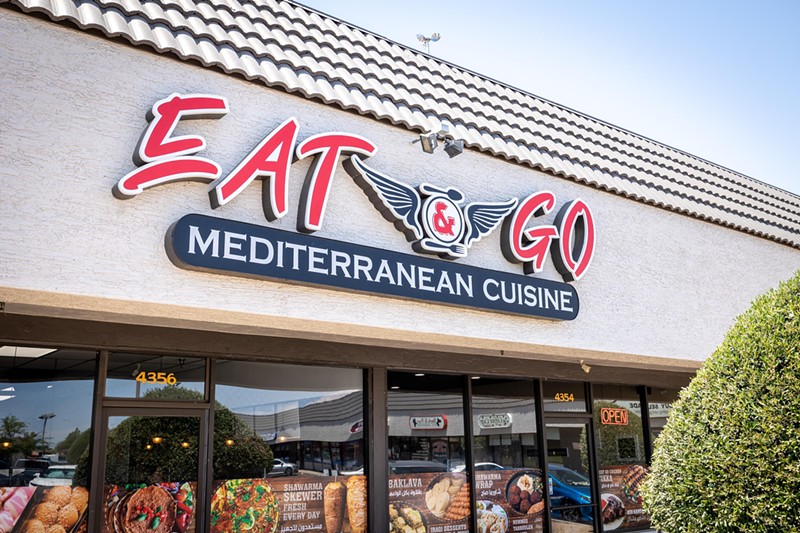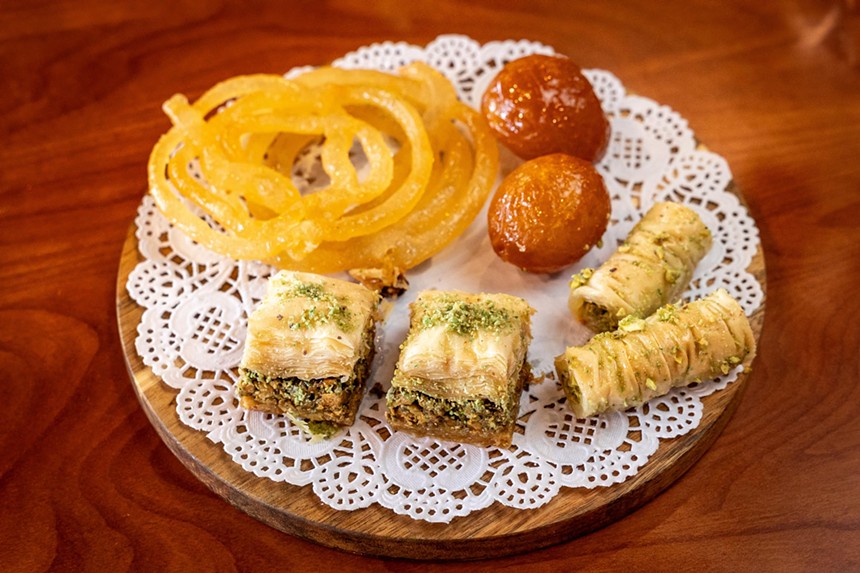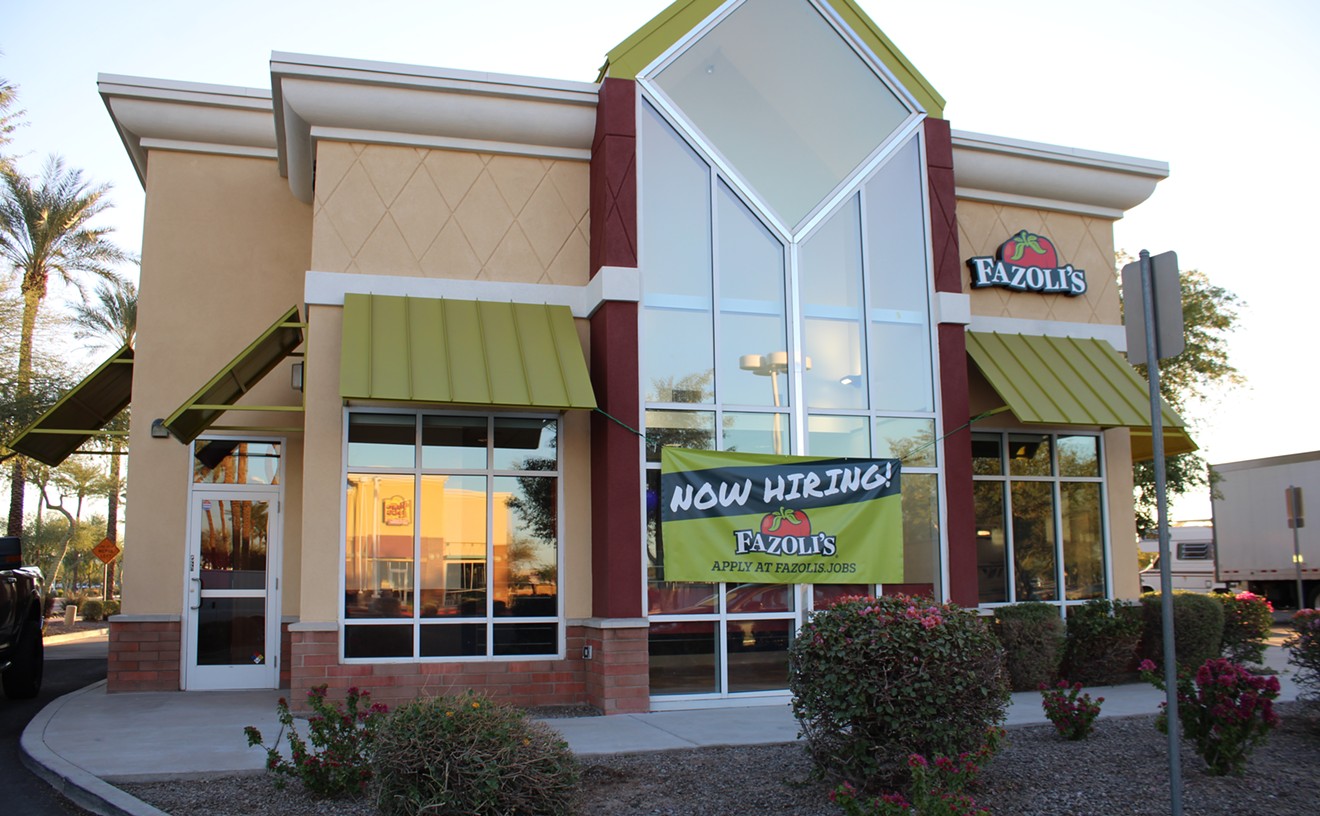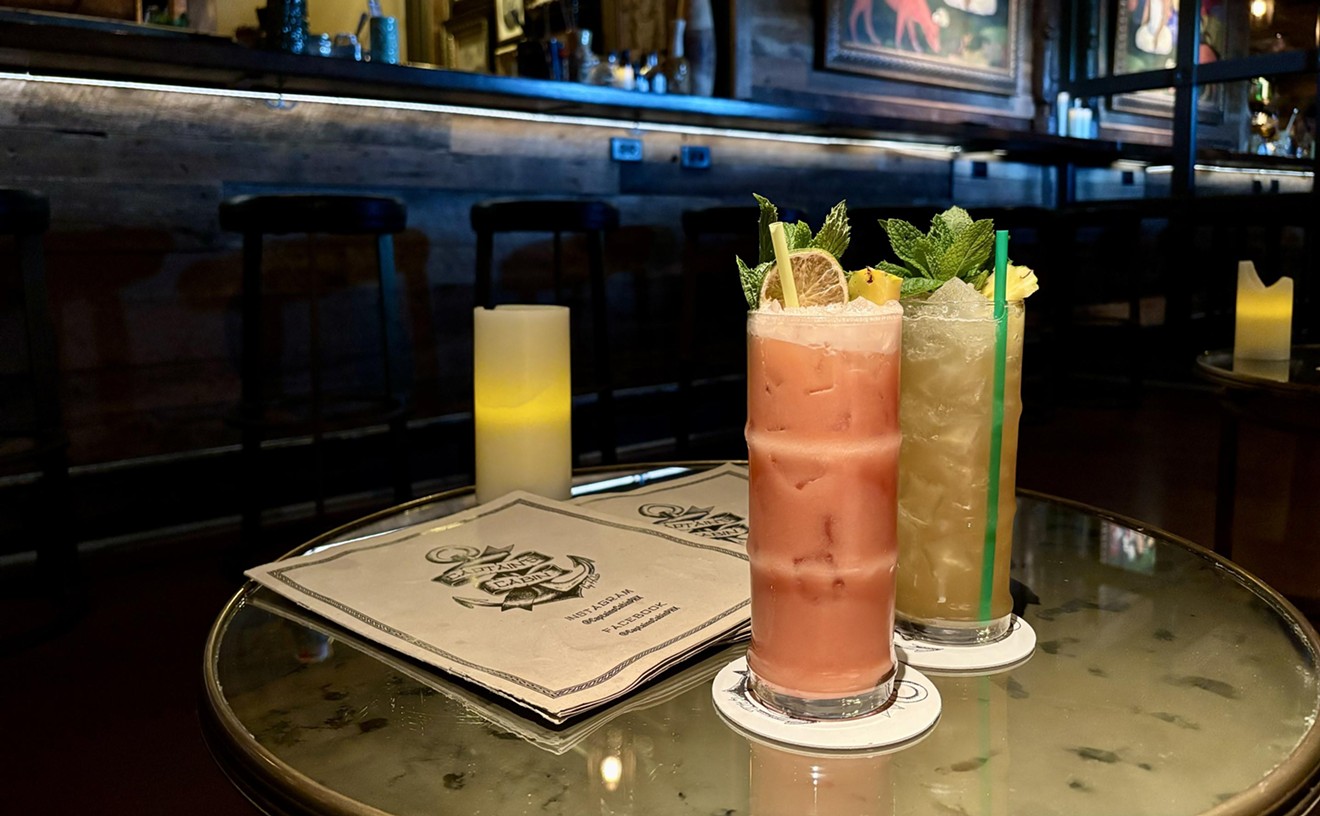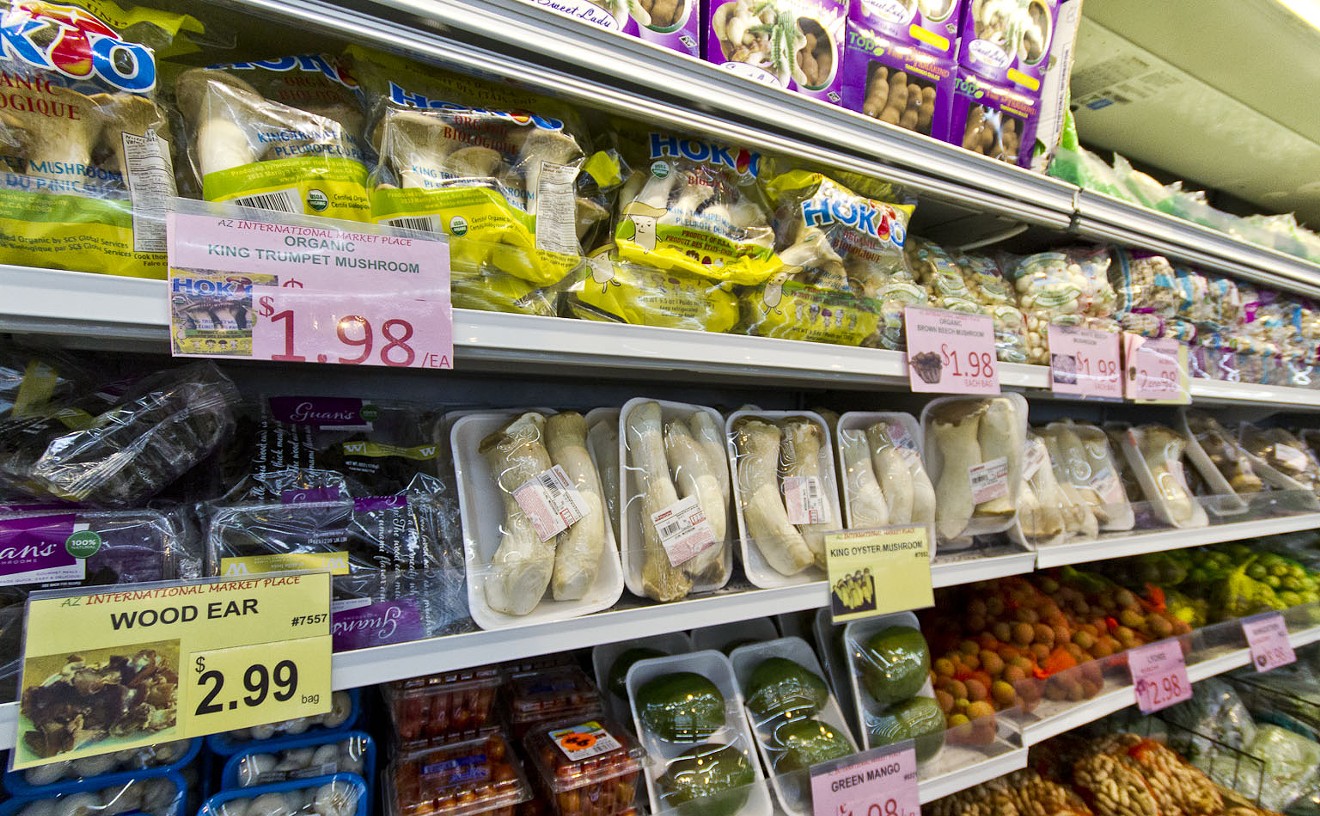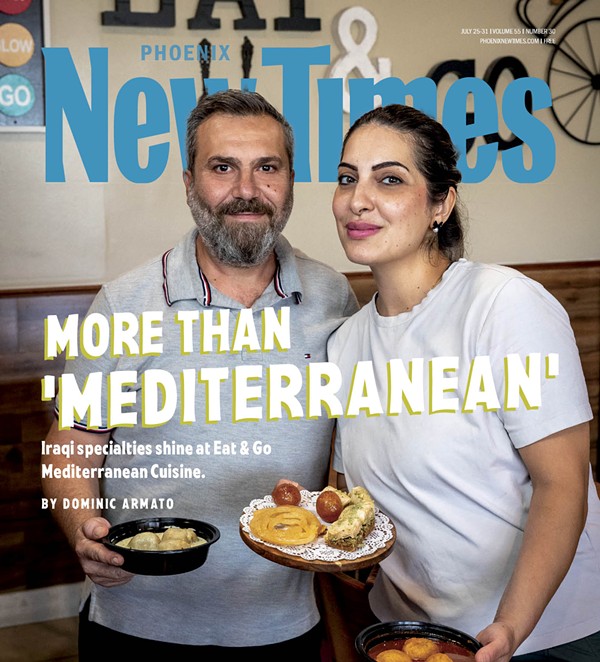Every storefront restaurant I drive by gives me anxiety.
Some are good, some are bad. Most are unremarkable. But you never know what you’ll find until you walk through the door and sit down to eat. And few things keep me up at night like the thought of missing a great restaurant that’s right under my nose.
I almost missed Eat & Go.
My attention was originally fixed just a few steps away, on the other side of the parking lot. I’d planned to review a wildly popular local fast food chain, so for months, I did my research. Every couple of weeks I’d drive through, park the car and tuck into my lunch while staring directly at Eat & Go Mediterranean Cuisine through my windshield.
Eat & Go doesn’t look like much from the street. And if you peek at the menu online, you’ll see the same dishes you’d find at countless shawarma shops around town: kabobs, wraps, hummus and the like.
But you never know for sure, do you? So, after hours sitting just outside their front door, I finally got around to stepping inside.
I wish I’d done it sooner.
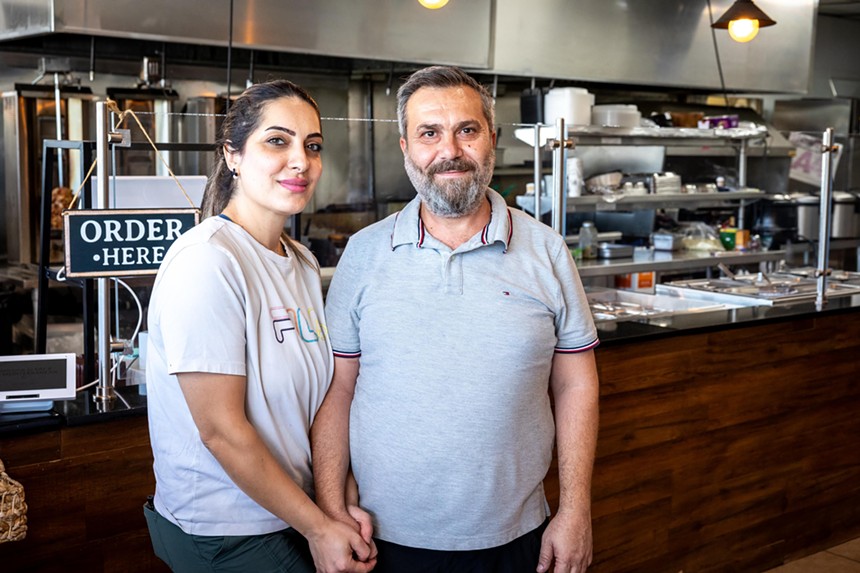
From Iraq to Glendale
This is a family restaurant, in every sense of the word.
Eat & Go’s owners, Ali Ghaleb and Mays Naoosh, came to Phoenix in 2016 as refugees from Baghdad, Iraq. Ghaleb is a restaurateur by trade, Naoosh by marriage, and the couple have served kabobs and wraps — along with a sneaky, previously unprinted menu of Iraqi specialties — since 2022.
“They tried many different Middle Eastern restaurants here, and they didn’t find the authentic Iraqi taste and culture, so they wanted to bring that to Arizona,” says Amenah Obaidi, who'd dropped by for lunch and stepped in to translate for Ghaleb. Though his English is excellent, Ghaleb is still learning the language and sometimes switches to Arabic to express his thoughts with more nuance. Obaidi, whom Naoosh calls her “sister,” is a friend of the family, a fan of their food and eager to help.
Obaidi isn’t the only devotee who walks through the door as we talk. It turns out Ghaleb and Naoosh have chosen a pretty good place to open up shop.
Since the 1991 Gulf War, more than 12,000 Iraqi refugees have settled in Phoenix. Like many others, Ghaleb and Naoosh were drawn here by a climate that’s similar to their home and a well-established Iraqi community built by local resettlement agencies.
Still, even with a built-in audience, launching a new restaurant is a trial. And unlike immigrants who sometimes have years or decades to plan a transition, refugees are resettled quickly and unexpectedly, often spending years learning English, saving money and establishing roots before they’re positioned to open a business.
Then, of course, there’s the question of which audience to target.
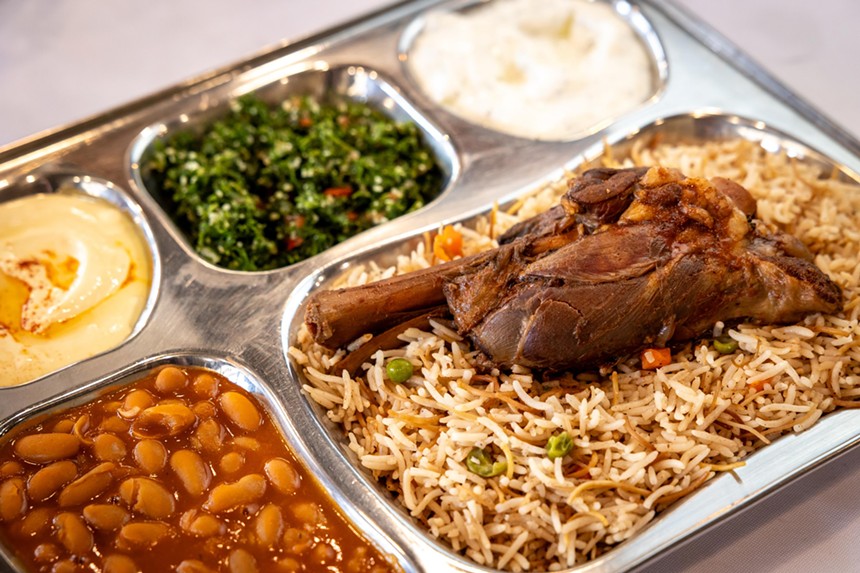
The meaning of “Mediterranean”
The restaurant's sign says "Mediterranean," but that's a bit of a misnomer.
The geographically astute will note that, while it isn’t terribly far away, Iraq has no Mediterranean coastline. But Ghaleb’s no fool, and it didn’t take him long to decode and mimic the local lingo.
To be fair, the myriad cuisines and cultures of the region are fluid, defying whatever territorial lines we’ve most recently drawn on the map. Iraqi cuisine shares much with the Levantine nations of the eastern Mediterranean, which in turn share much with the sea’s northern and southern coasts, and so on. Good food knows no borders, and it isn’t hard to trace its path from Italy to Istanbul to Iraq, and vice versa.
But “Mediterranean” in Phoenix — and most of the United States, for that matter — is less often a descriptive term than it is shorthand for the crossover hits of Arab cuisine. People like what they know, and the word “Mediterranean” creates the expectation that they’re going to get it, however simplified that expectation may be.
Ghaleb and Naoosh know that food. They grew up with some of it, and it's the food I first saw on their menu. They make it well.
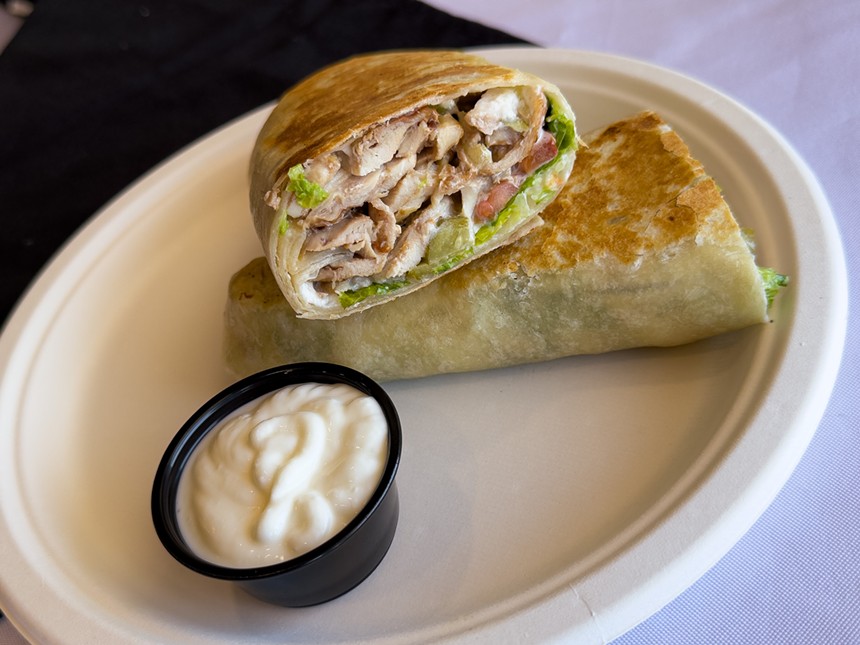
Shawarma shop standards
A piping hot cup of gently spiced yellow lentil soup — gratis — is always a welcome harbinger. No surer sign that good things are imminent, and Eat & Go’s spit-roasted meats live up to the promise of the restaurant's name.
Ghaleb slings one of my favorite chicken shawarma wraps in town. It’s an understated sort, shaved meat bundled up tight with pickles and a heavy dose of toum. But the seasoning is perfect, the meat juicy and sweet, and the perky toum packs a nice, garlicky wallop.
Kofta kabobs, both beef and chicken, are simply and skillfully spiced. Ghaleb lays on just a bit of char, lending a nice sizzling crust to their tender center — a fine grind that’s thoroughly mixed but not overworked. They pull apart with ease, which I imagine makes them difficult to grill, but that delicate texture is mighty pleasing on the palate.
Good as they are, I’m equally impressed by their accompaniments.
Ghaleb and Naoosh compose some lovely kabob meals — compartmentalized metal lunch trays featuring grilled meats and rice along with your choice of sides from a rotating selection. Some, like hummus and baba ghanoush, are the same as you’ll find elsewhere, albeit more creamy and flavorful than most. But I love the variety of simple vegetables that round out the trays.
You may get a salad of brightly dressed red cabbage and beets, or a scoop of stewed fava beans. The tabbouleh is a sassy sort, a pile of crisp minced parsley with a touch of bulgur and tomato, all saturated with fresh lemon juice. I’ve sampled silky soft potatoes swimming in a fresh tomato sauce and thick and creamy jajik — a cucumber, mint and yogurt salad that’s roughly analogous to tzatziki.
Dig a little deeper, though, and you start to notice dishes you typically won’t find at the corner shawarma shop.

Sneaky Iraqi specialties
If it’s available, don’t miss the bethinjania, an eggplant and pepper salad. Slick and icy cool, it sings with a piercing sweet-sour intensity. For a hot option, pick a ladleful of tepsi baytinijan, a hearty Iraqi eggplant casserole loaded with tomatoes and onions, topped with slabs of potato.
Or, forget the kabobs and give the quzi a spin.
Ghaleb is proud of his quzi, and he should be. It’s an understated, homey gem of a dish. This stewed lamb shank with sweet flesh that pulls right off the bone is barely seasoned, relying on the freshness of the meat and the careful extraction of its natural flavor.
The biryani beneath, on the other hand, is luxuriously spiced. Related to but more restrained than its South Asian cousins, Iraqi biryani is airy and light, built as much on aroma as it is on flavor, with a complex whiff of cinnamon, cardamom and clove.
It seems like there’s a different flatbread every time I visit, but a favorite is the lahm bi ajen. This bread bears countless names and variations throughout the region, but in this instance, it’s a thin, tender flatbread spread with spiced meat and just a touch of tomato and onion. It's straightforward and delicious, both fresh from the oven and a day later at home.
Eat & Go also may become one of my favorite stops for a late breakfast. Taking a cue from visitors in the know, I sample makhlama, a spiced egg omelet with tomatoes, onions and meat. As someone who prefers a savory breakfast with a little kick, this is precisely how I like to start my day. They give the omelet a crisp brown sizzle at the edges but leave it barely set and jiggling at the core. It's served with slices of raw tomato and onion, slivers of salty pickle, a healthy squeeze of fresh lemon and samoon — pillowy Iraqi bread right out of the oven.
For those unfamiliar with Iraqi cuisine, there’s a lot to take in. Fortunately, on the weekends, you can do it all at once.
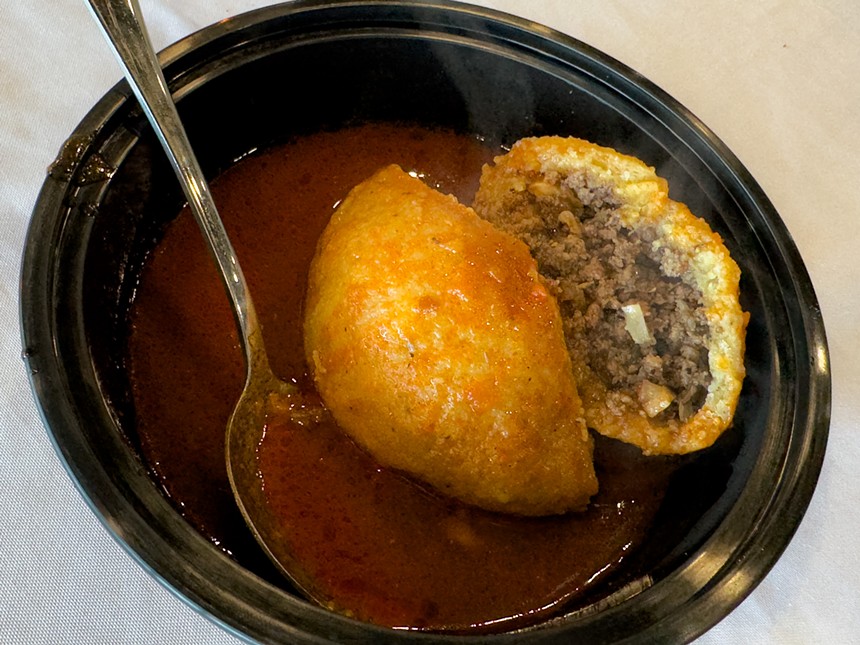
A Baghdad-style buffet
On Saturdays and Sundays, Eat & Go hosts a cozy little buffet — breakfast from 10 a.m.-1:30 p.m. and dinner from 2-5 p.m. — combining a rotating selection of the regular menu with special dishes that only appear on the weekend.
Fresh fruit joins a spread of dips and salads, alongside a mountain of fattoush — crisp greens and vegetables with fried flatbread chips. The lentil soup fills a commercial tureen, in case that first little cup isn’t enough. And when you pop open the chafing dishes, you’ll find a trove of sneaky delights that aren't listed on the menu.
Eat & Go’s dolmas are exceptional, whether you get the Syrian or the Iraqi variety. One of the cooks is Syrian, so sometimes you’ll find a style more Phoenicians will recognize — delicately spiced rice wrapped in tiny cigar shapes with tart pickled grape leaves. On other days, Iraqi dolmas make an appearance. Filled with both meat and rice, more aggressively spiced and slowly stewed in an intensely sour sauce of tomato and fresh lemon, they utilize not just grape leaves as wraps but also onion petals, whole peppers and large chunks of hollowed-out zucchini and eggplant.
What Ghaleb and Naoosh know as kubba, most Phoenicians know as kibbeh, but Eat & Go’s version is a very different dish than the crispy fried torpedoes found at most shawarma shops. These are spherical, varied in size and composed of spiced ground beef and almonds surrounded by a bulgur wheat dough. But rather than fried, they’re slowly stewed, either in a sultry fresh tomato sauce (kubba saray) or — in another Syrian spin — a tart and bright warm yogurt sauce seasoned with mint (kubba labanieh).
These kubba are mellow and comforting, a hearty stew rather than a crispy snack, and because Ghaleb takes the time to process fresh whole tomatoes, you can taste a little extra sunshine in the kubba saray.
Sticky sweets
Don't overlook dessert. Naoosh comes from a pastry family, and it shows in the three or four trays of sweets the restaurant offers every day.
Eat & Go’s baklava is some of the finest I’ve tasted in town — crisp, overflowing with fresh nuts and plied with plenty of honey and sugar, but not so much that it turns into a heavy, sticky mess. And the pistachio burma, a cylindrical variant thereof, is equally excellent.
If sticky sweet is your style, focus on the awamat. Chunks of fried dough that resemble abbreviated churros are dunked in a vat of scented sugar syrup, an exercise in unashamed excess. I personally prefer the zalabia, a cousin of South Asian jalebi — gram flour batter drizzled into hot oil to produce a crispy curlicue, similarly swabbed with an abundance of sticky syrup.
As families roll in for a meal and some sweets, it’s clear that Eat & Go has garnered a solid following. Why the uniquely Iraqi dishes remained an in-the-know secret for so long, I don’t care to speculate. But Ghaleb and Naoosh have noted — with pride — the interest in their very specific regional cuisine, and they’re working to make it more accessible. Naoosh is developing a revamped menu that leans away from the Mediterranean catch-all and deeper into the couple’s Iraqi cuisine, converting off-menu specials into regular items.
I hope it snares a broader audience. As I sink into a $9 shawarma wrap, the line at the local fast food chain across the parking lot is six cars deep.
Park the car, people. Walk through the door. You just never know.
Eat & Go Mediterranean Cuisine
4354 W. Thunderbird Road, Glendale
602-595-1522
eatngorestaurant.com
10 a.m. to 7 p.m. Tuesday-Saturday; 10 a.m. to 6 p.m. Sunday. Starters $5-$8; Wraps and sandwiches $8-$10; Plates $13-$24.
Some are good, some are bad. Most are unremarkable. But you never know what you’ll find until you walk through the door and sit down to eat. And few things keep me up at night like the thought of missing a great restaurant that’s right under my nose.
I almost missed Eat & Go.
My attention was originally fixed just a few steps away, on the other side of the parking lot. I’d planned to review a wildly popular local fast food chain, so for months, I did my research. Every couple of weeks I’d drive through, park the car and tuck into my lunch while staring directly at Eat & Go Mediterranean Cuisine through my windshield.
Eat & Go doesn’t look like much from the street. And if you peek at the menu online, you’ll see the same dishes you’d find at countless shawarma shops around town: kabobs, wraps, hummus and the like.
But you never know for sure, do you? So, after hours sitting just outside their front door, I finally got around to stepping inside.
I wish I’d done it sooner.

Eat & Go’s owners, Ali Ghaleb and Mays Naoosh, share recipes from their native Iraq.
Jacob Tyler Dunn
From Iraq to Glendale
This is a family restaurant, in every sense of the word.Eat & Go’s owners, Ali Ghaleb and Mays Naoosh, came to Phoenix in 2016 as refugees from Baghdad, Iraq. Ghaleb is a restaurateur by trade, Naoosh by marriage, and the couple have served kabobs and wraps — along with a sneaky, previously unprinted menu of Iraqi specialties — since 2022.
“They tried many different Middle Eastern restaurants here, and they didn’t find the authentic Iraqi taste and culture, so they wanted to bring that to Arizona,” says Amenah Obaidi, who'd dropped by for lunch and stepped in to translate for Ghaleb. Though his English is excellent, Ghaleb is still learning the language and sometimes switches to Arabic to express his thoughts with more nuance. Obaidi, whom Naoosh calls her “sister,” is a friend of the family, a fan of their food and eager to help.
Obaidi isn’t the only devotee who walks through the door as we talk. It turns out Ghaleb and Naoosh have chosen a pretty good place to open up shop.
Since the 1991 Gulf War, more than 12,000 Iraqi refugees have settled in Phoenix. Like many others, Ghaleb and Naoosh were drawn here by a climate that’s similar to their home and a well-established Iraqi community built by local resettlement agencies.
Still, even with a built-in audience, launching a new restaurant is a trial. And unlike immigrants who sometimes have years or decades to plan a transition, refugees are resettled quickly and unexpectedly, often spending years learning English, saving money and establishing roots before they’re positioned to open a business.
Then, of course, there’s the question of which audience to target.

The quzi is sparingly seasoned, relying on the freshness of the lamb shanks to produce its natural flavor.
Jacob Tyler Dunn
The meaning of “Mediterranean”
The restaurant's sign says "Mediterranean," but that's a bit of a misnomer.The geographically astute will note that, while it isn’t terribly far away, Iraq has no Mediterranean coastline. But Ghaleb’s no fool, and it didn’t take him long to decode and mimic the local lingo.
To be fair, the myriad cuisines and cultures of the region are fluid, defying whatever territorial lines we’ve most recently drawn on the map. Iraqi cuisine shares much with the Levantine nations of the eastern Mediterranean, which in turn share much with the sea’s northern and southern coasts, and so on. Good food knows no borders, and it isn’t hard to trace its path from Italy to Istanbul to Iraq, and vice versa.
But “Mediterranean” in Phoenix — and most of the United States, for that matter — is less often a descriptive term than it is shorthand for the crossover hits of Arab cuisine. People like what they know, and the word “Mediterranean” creates the expectation that they’re going to get it, however simplified that expectation may be.
Ghaleb and Naoosh know that food. They grew up with some of it, and it's the food I first saw on their menu. They make it well.

The chicken shawarma wrap, dressed with a pungent, garlicky toum, is tender and juicy.
Dominic Armato
Shawarma shop standards
A piping hot cup of gently spiced yellow lentil soup — gratis — is always a welcome harbinger. No surer sign that good things are imminent, and Eat & Go’s spit-roasted meats live up to the promise of the restaurant's name.Ghaleb slings one of my favorite chicken shawarma wraps in town. It’s an understated sort, shaved meat bundled up tight with pickles and a heavy dose of toum. But the seasoning is perfect, the meat juicy and sweet, and the perky toum packs a nice, garlicky wallop.
Kofta kabobs, both beef and chicken, are simply and skillfully spiced. Ghaleb lays on just a bit of char, lending a nice sizzling crust to their tender center — a fine grind that’s thoroughly mixed but not overworked. They pull apart with ease, which I imagine makes them difficult to grill, but that delicate texture is mighty pleasing on the palate.
Good as they are, I’m equally impressed by their accompaniments.
Ghaleb and Naoosh compose some lovely kabob meals — compartmentalized metal lunch trays featuring grilled meats and rice along with your choice of sides from a rotating selection. Some, like hummus and baba ghanoush, are the same as you’ll find elsewhere, albeit more creamy and flavorful than most. But I love the variety of simple vegetables that round out the trays.
You may get a salad of brightly dressed red cabbage and beets, or a scoop of stewed fava beans. The tabbouleh is a sassy sort, a pile of crisp minced parsley with a touch of bulgur and tomato, all saturated with fresh lemon juice. I’ve sampled silky soft potatoes swimming in a fresh tomato sauce and thick and creamy jajik — a cucumber, mint and yogurt salad that’s roughly analogous to tzatziki.
Dig a little deeper, though, and you start to notice dishes you typically won’t find at the corner shawarma shop.

Previously an off-menu breakfast item, the makhlama sizzles up eggs and meat and is served with samoon, a puffy Iraqi bread.
Dominic Armato
Sneaky Iraqi specialties
If it’s available, don’t miss the bethinjania, an eggplant and pepper salad. Slick and icy cool, it sings with a piercing sweet-sour intensity. For a hot option, pick a ladleful of tepsi baytinijan, a hearty Iraqi eggplant casserole loaded with tomatoes and onions, topped with slabs of potato.Or, forget the kabobs and give the quzi a spin.
Ghaleb is proud of his quzi, and he should be. It’s an understated, homey gem of a dish. This stewed lamb shank with sweet flesh that pulls right off the bone is barely seasoned, relying on the freshness of the meat and the careful extraction of its natural flavor.
The biryani beneath, on the other hand, is luxuriously spiced. Related to but more restrained than its South Asian cousins, Iraqi biryani is airy and light, built as much on aroma as it is on flavor, with a complex whiff of cinnamon, cardamom and clove.
It seems like there’s a different flatbread every time I visit, but a favorite is the lahm bi ajen. This bread bears countless names and variations throughout the region, but in this instance, it’s a thin, tender flatbread spread with spiced meat and just a touch of tomato and onion. It's straightforward and delicious, both fresh from the oven and a day later at home.
Eat & Go also may become one of my favorite stops for a late breakfast. Taking a cue from visitors in the know, I sample makhlama, a spiced egg omelet with tomatoes, onions and meat. As someone who prefers a savory breakfast with a little kick, this is precisely how I like to start my day. They give the omelet a crisp brown sizzle at the edges but leave it barely set and jiggling at the core. It's served with slices of raw tomato and onion, slivers of salty pickle, a healthy squeeze of fresh lemon and samoon — pillowy Iraqi bread right out of the oven.
For those unfamiliar with Iraqi cuisine, there’s a lot to take in. Fortunately, on the weekends, you can do it all at once.

Kubba saray — ground lamb and almonds inside a bulgur wheat shell — are gently stewed in a fresh tomato sauce rather than fried.
Dominic Armato
A Baghdad-style buffet
On Saturdays and Sundays, Eat & Go hosts a cozy little buffet — breakfast from 10 a.m.-1:30 p.m. and dinner from 2-5 p.m. — combining a rotating selection of the regular menu with special dishes that only appear on the weekend.Fresh fruit joins a spread of dips and salads, alongside a mountain of fattoush — crisp greens and vegetables with fried flatbread chips. The lentil soup fills a commercial tureen, in case that first little cup isn’t enough. And when you pop open the chafing dishes, you’ll find a trove of sneaky delights that aren't listed on the menu.
Eat & Go’s dolmas are exceptional, whether you get the Syrian or the Iraqi variety. One of the cooks is Syrian, so sometimes you’ll find a style more Phoenicians will recognize — delicately spiced rice wrapped in tiny cigar shapes with tart pickled grape leaves. On other days, Iraqi dolmas make an appearance. Filled with both meat and rice, more aggressively spiced and slowly stewed in an intensely sour sauce of tomato and fresh lemon, they utilize not just grape leaves as wraps but also onion petals, whole peppers and large chunks of hollowed-out zucchini and eggplant.
What Ghaleb and Naoosh know as kubba, most Phoenicians know as kibbeh, but Eat & Go’s version is a very different dish than the crispy fried torpedoes found at most shawarma shops. These are spherical, varied in size and composed of spiced ground beef and almonds surrounded by a bulgur wheat dough. But rather than fried, they’re slowly stewed, either in a sultry fresh tomato sauce (kubba saray) or — in another Syrian spin — a tart and bright warm yogurt sauce seasoned with mint (kubba labanieh).
These kubba are mellow and comforting, a hearty stew rather than a crispy snack, and because Ghaleb takes the time to process fresh whole tomatoes, you can taste a little extra sunshine in the kubba saray.
Sticky sweets
Don't overlook dessert. Naoosh comes from a pastry family, and it shows in the three or four trays of sweets the restaurant offers every day.Eat & Go’s baklava is some of the finest I’ve tasted in town — crisp, overflowing with fresh nuts and plied with plenty of honey and sugar, but not so much that it turns into a heavy, sticky mess. And the pistachio burma, a cylindrical variant thereof, is equally excellent.
If sticky sweet is your style, focus on the awamat. Chunks of fried dough that resemble abbreviated churros are dunked in a vat of scented sugar syrup, an exercise in unashamed excess. I personally prefer the zalabia, a cousin of South Asian jalebi — gram flour batter drizzled into hot oil to produce a crispy curlicue, similarly swabbed with an abundance of sticky syrup.
As families roll in for a meal and some sweets, it’s clear that Eat & Go has garnered a solid following. Why the uniquely Iraqi dishes remained an in-the-know secret for so long, I don’t care to speculate. But Ghaleb and Naoosh have noted — with pride — the interest in their very specific regional cuisine, and they’re working to make it more accessible. Naoosh is developing a revamped menu that leans away from the Mediterranean catch-all and deeper into the couple’s Iraqi cuisine, converting off-menu specials into regular items.
I hope it snares a broader audience. As I sink into a $9 shawarma wrap, the line at the local fast food chain across the parking lot is six cars deep.
Park the car, people. Walk through the door. You just never know.
Eat & Go Mediterranean Cuisine
4354 W. Thunderbird Road, Glendale602-595-1522
eatngorestaurant.com
10 a.m. to 7 p.m. Tuesday-Saturday; 10 a.m. to 6 p.m. Sunday. Starters $5-$8; Wraps and sandwiches $8-$10; Plates $13-$24.

